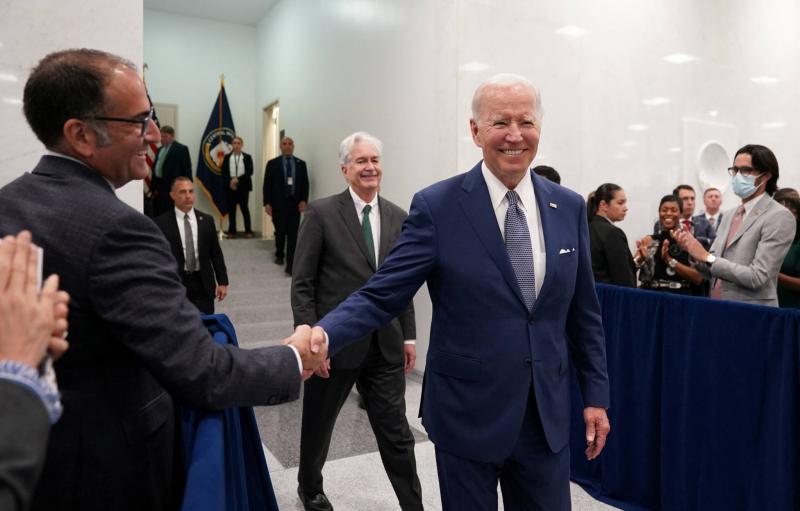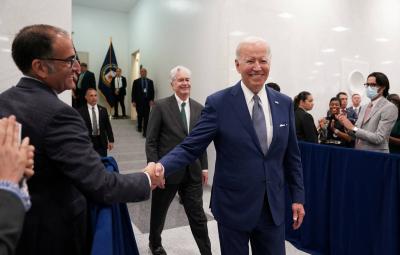Since the outbreak of the war in Gaza, U.S. President Joe Biden has assigned several officials to manage various aspects related to the conflict, amid escalating tensions in the Middle East.
The Israeli newspaper "Haaretz" highlighted in a report what it described as Biden's "inner circle" involved in the war, including participants in hostage negotiations, officials responsible for preventing the conflict from spreading to Lebanon and the broader Middle East, as well as those managing humanitarian assistance in Gaza. U.S. Secretary of State Antony Blinken has been seen as the general gauge for the administration's response to the crisis, through his diplomatic tours following the outbreak of the war and statements reflecting Washington's perspective on the ground, according to the Israeli newspaper.
According to "Haaretz," Blinken's remarks consistently expressed growing concern over the humanitarian crisis in Gaza and Israel's failure to minimize civilian casualties. His comments in Tokyo on November 8 are often cited, where he detailed what he called the "five no's," representing U.S. principles regarding the Gaza war and the future of the Israeli-Palestinian conflict. He famously stated: "No forced displacement from Gaza, no using Gaza as a platform for terrorism, no reoccupation of Gaza after the conflict, no blockade of Gaza, and no reduction of Gaza's territory."
National Security Adviser Jake Sullivan, particularly through his deputy John Feiner and Senior Middle East Adviser Brett McGurk, is considered "the closest voice to Biden in all foreign policy matters," as per the newspaper. These officials were "among the strongest advocates for rearranging Israel's regional integration priorities before October 7 until the Hamas attack overturned this approach." Since then, they have publicly and covertly intensified efforts to encourage Israeli-Saudi normalization as a path towards a two-state solution.
Vice President Kamala Harris has also emerged in recent months regarding foreign policy, having called, in frequent communications with Israeli President Isaac Herzog and in her speech at the United Nations Climate Change Conference (COP28) in December, for Israel to do more to protect civilians. Simultaneously, her husband, Doug Emhoff (the first Jewish spouse of a U.S. President or Vice President), has served as "the face of the administration in combating rising local anti-Semitism caused by the war," according to the newspaper.
U.S. Ambassador to the United Nations, Linda Thomas-Greenfield, plays a role on the global stage. Under her leadership, the U.S. was the only member of the U.N. Security Council to veto a resolution calling for a ceasefire in Gaza. She also oversaw negotiations aimed at significantly reshaping a rare U.N. Security Council resolution intended to increase aid to Gaza.
Within Israel, the U.S. Ambassador, Jack Lew, who was quickly appointed within weeks after the war, acted as a key intermediary on the ground between the U.S. and Israeli governments. While McGurk is primarily involved in all matters related to the conflict, he is increasingly focusing on negotiations regarding the hostages held in Gaza specifically as a key to ending the war and transitioning to normalization with Saudi Arabia and efforts towards a two-state solution, according to "Haaretz."
Aside from McGurk, CIA Director William Burns took the lead in hostage negotiations. His shuttle diplomacy with Egypt and Qatar, along with his communications with Mossad Director David Barnea, significantly facilitated a temporary humanitarian truce in November and the release of some hostages.
Burns' efforts have the support of Roger Carstens, who works at the State Department as the Special Presidential Envoy for Hostage Affairs, and his deputy Stephen Gillin, who traveled to Israel with Blinken directly after October 7 and remained there to work with the families of the hostages.
U.S. Secretary of Defense Lloyd Austin has maintained continuous communication with his Israeli counterpart Yoav Gallant and the Chief of Staff of the Israel Defense Forces, Herzi Halevi, receiving tactical updates on Israeli military operations and sharing his own experiences and lessons regarding urban warfare. He has also focused on strengthening the U.S. military presence in the Middle East as a potential deterrent against Iran and its regional proxies.
### Humanitarian Assistance for Gaza
U.S. Central Command leader Michael Kurilla was responsible for direct military communications with Israel, gaining substantial attention amid Houthi attacks on international shipping in the Red Sea and subsequent U.S. strikes on the Houthis in Yemen. Moreover, Amos Hochstein, Senior Advisor for Global Energy Security, was tasked with working with Lebanon, which has been on the brink of boiling over in recent weeks amid escalating clashes between Israel and Hezbollah and the assassination of a senior Hamas official in Beirut.
While Biden did not appoint a special envoy to oversee the Israeli-Palestinian conflict, he appointed David Satterfield as an envoy for the humanitarian crisis in Gaza just days after the war began. Satterfield worked with the right-wing Israeli government to expand humanitarian assistance entering Gaza and the need for new mechanisms to prevent clashes.
In a related context, Samantha Power, the Administrator of the U.S. Agency for International Development (USAID), played a significant role from Washington in coordinating U.S. efforts to provide humanitarian assistance to Palestinians. Power traveled to Egypt and oversaw the delivery of over 220,000 kilograms of food aid, along with tens of millions of dollars in complementary assistance, including the establishment of a field hospital and expanding aid to include commercial goods.
At the same time, senior officials at the State Department are largely focused on maintaining relations with the Palestinian Authority, whose current and future role as a governing body for Palestinians has become a point of contention between the U.S. and Israel. U.S. Special Envoy for Palestinian Affairs, Hady Amr, visited Ramallah earlier this month to meet with Palestinian Prime Minister Mohammad Shtayyeh, who emphasized the need for an immediate ceasefire and the ongoing financial pressures faced by the Palestinian Authority due to withheld tax revenues from Israel.
Other senior officials within the U.S. State Department have also played roles in communicating with Israeli, Palestinian, and Jordanian officials, including Principal Deputy Assistant Secretary of State Henry Wooster, Senior Middle East diplomat Barbara Leaf, Advisor Derek Chollet, Security Coordinator Michael Fenzel, and Deputy Assistant Secretary of State for Israeli-Palestinian Affairs Andrew Miller.
Among those playing leadership roles within the U.S. government in planning for Gaza's governance after the war are two of Harris's senior advisors, Phil Gordon and Ilan Goldenberg.




